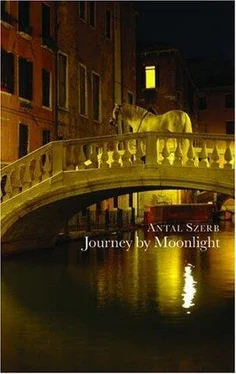“You see I eat only cold meat, nothing else,” said Waldheim. “But to make it less boring for you I’ve arranged for a bit of variety. Just wait a moment … ”
After a long search he produced a banana. The smile with which he presented it to Mihály seemed to say, “Did you ever see such thoughtful housekeeping?”
This student-like casualness and incompetence Mihály found enchanting.
“Here’s a man who’s achieved the impossible,” he thought with a touch of envy, as Waldheim stuffed the raw ham into his mouth and continued to hold forth. “There’s a man who’s managed to stay fixed at the age that suits him. Everyone has one age that’s just right for him, that’s certain. There are people who remain children all their lives, and there are others who never cease to be awkward and absurd, who never find their place until suddenly they become splendidly wise old men and women: they have come to their real age. The amazing thing about Waldheim is that he’s managed to remain a university student at heart without having to give up the world, or success, or the life of the mind. He’s gone down a path where his emotional immaturity doesn’t seem to be noticed, or is even an advantage, and he pays only as much heed to reality as is consistent with the limitations of his own being. That’s wonderful. Now if only I could manage something like that … ”
The meal was barely over when Waldheim looked at his watch and muttered excitedly:
“Holy heavens, I’ve got some really urgent business with a woman, just nearby. Please, if you’ve nothing better to do, it would be very kind if you would come along and wait for me. It really won’t take long. Then we can find a little hostelry and continue our really interesting dialogue … ” (“He obviously hasn’t noticed that I’ve not said a single word yet,” thought Mihály.)
“I’d be delighted to go with you,” he said.
“I’m extremely fond of women,” Waldheim announced as they walked along. “Perhaps excessively. You know, when I was young I didn’t get my share of women as I wanted to, and as I should have, partly because when you’re young you’re so stupid, and partly because my strict upbringing forbade it. I was brought up by my mother, who was the daughter of a pfarrer , a real Imperial German parish priest. As a child I was once with them and for some reason I asked the old man who Mozart was. ‘ Der war ein Scheunepurzler ,’ he said, which means, more or less, someone who does somersaults in a barn to amuse the yokels. For the old man all artists fell into that category. So nowadays I feel that I can never do enough to make up for what I missed in the way of women when I was twenty-five. But here we are. Hang on a moment, won’t you. I shan’t be long.”
He disappeared through a dark doorway. Mihály walked up and down, thoughtfully but in good spirits. After a while he heard an odd, amused coughing. He looked up. Waldheim had thrust his bright round head out of a window.
“Ahem. I’m on my way.”
“A very nice lady,” he said as he emerged. “Breasts hang down a bit, but it’s not a problem. You have to get used to that here. I met her in the Forum and made a conquest of her by telling her that the Black Stone was probably a phallic symbol. You really can’t imagine how useful religious history can be for getting around women. They eat it out of my hand. Mind you, I fear you could probably do the same with differential calculus or double-entry book-keeping, so long as you talked about it with the proper intensity. They never listen to what you actually say. Or if they do listen, they never understand. All the same they can sometimes have you on. Sometimes they really are almost human. Never mind. I love them. And they love me, that’s the main thing. So, let’s go in here.”
Mihály made an involuntary grimace when he saw the place Waldheim proposed entering.
“I’m not saying it’s pretty, but it’s very cheap. But I see, you’re still the fussy little boy you were as a student. Never mind. For once we’ll go somewhere better, for your sake.”
Again came the smile that spoke consciousness of great generosity, as he added that, also as a favour to Mihály, he would be quite happy to pay for his own drinks in the more expensive place.
They went into an establishment that was possibly a shade or two better. Waldheim again held forth for a while, then seemed to become rather tired. For a few moments he seemed lost in thought, then turned with alarming suddenness towards Mihály:
“But what have you been doing all these years?”
Mihály smiled.
“I learnt the trade, and worked in my father’s firm.”
“You worked? In the past tense? And now?”
“At the moment, nothing. I ran away from home. I loaf around here and try to think about what I should be doing with myself.”
“What you should be doing? How can there be a question? Take up religious history. Believe me, it’s the most topical subject today.”
“But why do you think I should become a student? What have I to do with the academic life?”
“Because anyone who isn’t actually stupid ought to study, in the interests of his soul’s salvation. It’s the only thing worth doing. I don’t know, perhaps also art and music … but to spend your time doing anything else, like working in a commercial company, for a man who isn’t totally stupid … I’ll tell you what that is: affectation.”
“Affectation? How do you mean?”
“Look. I remember you started off as a pretty decent religious historian. I’m not saying … well, you were a bit slow on the uptake but hard work can make up for a lot of things and people with far less talent than you have gone on to become excellent scholars, in fact … And then, I don’t know the facts but I can imagine what went on in your middle-class soul. You found that the academic path doesn’t guarantee a living, that you didn’t want the boring routine of school-teaching, and this and that, so really you had to go for something practical, considering all the supposed necessities of a wealthy person. This is what I call affectation. Because even you realise that these supposed necessities aren’t real. The practical career is a myth, a humbug, invented to cheer themselves up by people who aren’t capable of doing anything intellectual. But you’ve got too much sense to be taken in by them. With you it’s just an affectation. And it’s high time you gave up this pose, and got back where you belong, in the academic life.”
“And what do I live on?”
“My God, it’s not a problem. You see, even I manage.”
“Yes, on your salary as a university teacher.”
“True. But I could equally live without it. People shouldn’t throw money about. I’ll teach you how to live on tea and salami. Very healthy. You people don’t know how to economise, that’s the trouble.”
“But Rudi, there’s another problem. I’m not very sure that a life of scholarship would be as satisfying for me as it is for you … I don’t have the enthusiasm … I can’t really believe in the importance of these things … ”
“What sort of things are you talking about?”
“Well, for example, the factual basis of religious history. What I’m saying … sometimes I think … does it really matter exactly why the wolf reared Romulus and Remus? … ”
“How the hell could it not matter? You’re utterly crazy. No, it’s just affectation. But that’s enough talk for now. It’s time to go back and work.”
“Now? But it’s past midnight!”
“Yes, that’s when I’m able to work: no interruptions, and for some reason I don’t even think about women then. I’ll work now until four, and then run for an hour.”
“You’ll do what?”
Читать дальше












